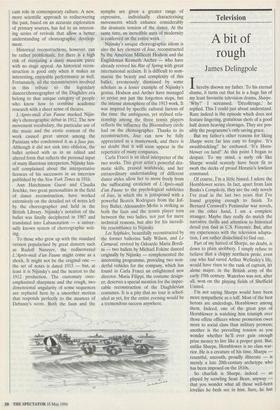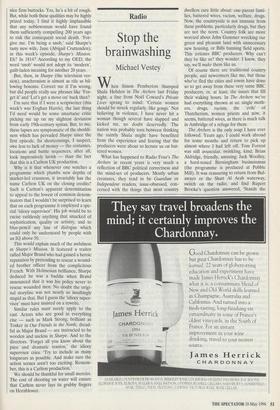Television
A bit of rough
James Delingpole
Ihereby disown my father. To his eternal shame, it turns out that he is a huge fan of my least favourite television drama, Sharpe. `Why?' I screamed. 'Décolletage,' he replied. This I could just about understand. Rare indeed is the episode which does not feature lingering, gratuitous shots of a good half dozen heaving cleavages. They are pos- sibly the programme's only saving grace.
But my father's other reasons for liking Sharpe were far less easy to forgive. 'It's swashbuckling!' he enthused. 'It's Horn- blower on land!' At this point I began to despair. To my mind, a surly oik like Sharpe would scarcely have been fit to swab the decks of proud Horatio's lowliest command.
Of course, I'm a little biased. I adore the Hornblower series. In fact, apart from lain Banks's Complicity, they are the only novels I've read in the last two years that I've found gripping enough to finish. To Bernard Cornwell's Peninsular war novels, on the other hand, I am a complete stranger. Maybe they really do match the narrative thrills and attention to historical detail you find in C.S. Forester. But, after my experiences with the television adapta- tion, I am rather disinclined to find out.
Part of my hatred of Sharpe, no doubt, is down to plain snobbery. I simply refuse to believe that a chippy northern prole, even one who had saved Arthur Wellesley's life, would have risen to the rank of captain, let alone major, in the British army of the early 19th century. Waterloo was not, after all, won on the playing fields of Sheffield United.
I'm not saying Sharpe would have been more sympathetic as a toff. Most of the best heroes are underdogs, Hornblower among them. Indeed, one of the great joys of Hornblower is watching him triumph over those effete officers whose promotion owes more to social class than military prowess; another is the prevailing tension as you wonder whether he'll ever gain enough prize money to live like a proper gent. But, unlike Sharpe, Hornblower is no class war- rior. He is a creature of his time. Sharpe resentful, uncouth, proudly illiterate — is merely a late 20th-century archetype who has been imposed on the 1810s.
So churlish is Sharpe, indeed — as played by scowling Sean Bean, anyway that you wonder what all those well-born lovelies he beds see in him. Sure, he has nice firm buttocks. Yes, he's a bit of rough. But, while both these qualities may be highly prized today, I find it highly implausible that any noblewoman would have found them sufficiently compelling 200 years ago to risk the consequent social death. 'For- give me. I'm being a snob,' said Sharpe's tasty new wife, Jane (Abigail Cruttenden), in this week's episode, Sharpe's Mission. Eh? In 1814? According to my OED, the word 'snob' would not adopt its 'modern', guilt-laden meaning for another 20 years.
But, then, in Sharpe (the television ver- sion), anachronism is almost as rife as bil- lowing bosoms. Correct me if I'm wrong, but did people really use phrases like 'For- get it' and 'Let's get a move on' back then?
I'm sure that if I were a scriptwriter (this week's was Eoghan Harris), the last thing I'd need would be some smartarse critic picking me up on my slightest deviation from early 19th-century syntax. But, to me, these lapses are symptomatic of the shoddi- ness which has pervaded Sharpe since the first episode. Its shortcomings, I suspect, owe less to lack of money — the costumes, locations and battle sequences, after all, look impressively lavish — than the fact that this is a Carlton UK production.
Why is it that whenever one watches a programme which plumbs new depths of market-led crassness, it invariably has the name Carlton UK on the closing credits? Such is Carlton's apparent determination to appeal to the lowest of common denom- inators that I wouldn't bb surprised to learn that on each programme it employed a spe- cial 'idiocy supervisor'. His job would be to excise ruthlessly anything that smacked of sophistication, quality or artistry, and to blue-pencil any line of dialogue which could only be understood by people with an IQ above 50.
This would explain much of the awfulness in Sharpe's Mission. It featured a traitor called Major Brand who had gained a heroic reputation by pretending to rescue a wound- ed brother officer from the complicitous French. With Holmesian brilliance, Sharpe deduced he was a baddie when Brand announced that it was his policy never to rescue wounded men. No doubt the origi- nal storyline was not nearly so insultingly stupid as that. But I guess the Idiocy super- visor' must have insisted on a rewrite.
Similar rules must surely apply to the cast. Actors who are good in everything else — such as Mark Strong, brilliant as Tosker in Our Friends in the North, dread- ful as Major Brand — are instructed to be wooden and useless in Sharpe. And to the directors. 'Forget all you know about the pace and dramatic tension,' the idiocy supervisor cries. 'Try to include as many longueurs as possible. And make sure the action scenes aren't too exciting. Remem- ber, this is a Carlton production.'
We should be thankful for small mercies. The cost of shooting on water will ensure that Carlton never lays its grubby fingers on Hornblower.



































































 Previous page
Previous page